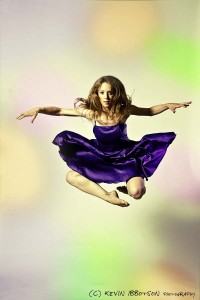 In the studio, we all want to do our best. We’re always looking in the mirror, trying to make our bodies do something new or challenging, and we’re always raising the standard for ourselves. It’s what makes us grow. Unfortunately, sometimes this feeling of ambition and expectation can make us feel inadequate. Sometimes we analyze our bodies so closely that we think there’s something wrong with us.
In the studio, we all want to do our best. We’re always looking in the mirror, trying to make our bodies do something new or challenging, and we’re always raising the standard for ourselves. It’s what makes us grow. Unfortunately, sometimes this feeling of ambition and expectation can make us feel inadequate. Sometimes we analyze our bodies so closely that we think there’s something wrong with us.
We talked body image with Katrina Errico, instructor and choreographer at Studio 19 Centre for Performing Arts in Eustis, Florida. She shared her experience with her own students and gave us some valuable advice about keeping a healthy attitude.
Is this a common issue among your students?
I see this a lot, especially with my teenage girls. For our adult students, we’re a lot more lenient with our dress code because we know how intimidating tights and a leotard can be. A lot of our adult students are women who have had children, haven’t danced in years or even have never danced before, and they don’t feel comfortable having their bodies on full display in class. If they can wear their favorite yoga pants and a tank top, they feel more secure and confident, and the experience can be about learning, not about comparing body types.
Why do you think we feel the need to compare ourselves?
Unfortunately, I think it’s natural to want to compare yourself. You’re in a room full of mirrors with a bunch of people you barely know, and you want to measure up. It can make you feel vulnerable — I don’t think there’s one of us out there who hasn’t looked at their body and wished they could change something about it.
Any tips for beginners or ballerinas intimidated by the big mirror?
- The most important thing to remember is that every single body is unique and special. Be grateful for the things your body can do for you, and recognize your unique talents. Maybe you’ve got a great extension, or a flexible back, or elegant epaulement. Whatever it is, your body is amazing for it.
- Compare yourself only to yourself; watch your progress and be proud of it. Don’t hold yourself to expectations meant for someone else’s body, and never talk down to yourself when you don’t get it right.
- Know your nutrition. Every successful ballerina knows that health comes first, and that a well-balanced meal is what your body needs to grow stronger between classes.
- Be patient with your body. Muscle tone and flexibility aren’t achieved overnight, and pushing yourself to rush the process can cause serious injury. We want healthy, happy bodies that can dance for a lifetime.
Image via Katrina Errico
 Claire started dance classes at the age of 5, taking classes in ballet, modern and jazz and continued until the age of 13. After a short break from dance she then returned to dance at 16 with tap, contemporary, jazz and ballet and continued on to study BA (hons) Dance Studies at Roehampton University, London. Claire has always been very interested in how dance can improve your health both mentally and physically for professional dancers and people new to dance. She is currently studying Msc Dance Science at Trinity Laban Conservatoire of Music and Dance, London. Find out more about Claire at
Claire started dance classes at the age of 5, taking classes in ballet, modern and jazz and continued until the age of 13. After a short break from dance she then returned to dance at 16 with tap, contemporary, jazz and ballet and continued on to study BA (hons) Dance Studies at Roehampton University, London. Claire has always been very interested in how dance can improve your health both mentally and physically for professional dancers and people new to dance. She is currently studying Msc Dance Science at Trinity Laban Conservatoire of Music and Dance, London. Find out more about Claire at 
